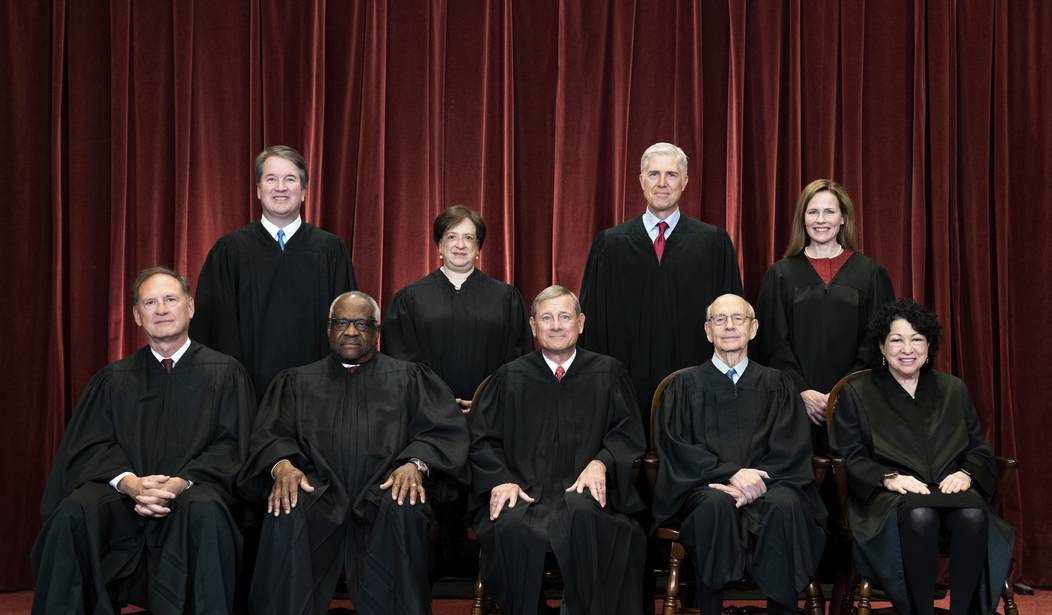On Wednesday, the Supreme Court will begin hearing arguments in the case of Dobbs v. Jackson Women’s Health Organization, a Mississippi law that makes abortion illegal after the first 15 weeks of pregnancy. It’s been called the “biggest abortion case in decades,” and it may serve to prove how effectively Donald Trump delivered on his promises to appoint Supreme Court judges who would overturn Roe v. Wade.
This case isn’t the first abortion case the Court has begun to hear this term, as Amy Howe reports at SCOTUS Blog:
Wednesday’s argument in Dobbs, which involves a Mississippi ban on almost all abortions after the 15th week of pregnancy, comes 30 days after the court heard arguments in another consequential abortion controversy: a pair of challenges to a six-week abortion ban that took effect in Texas on Sept. 1. In the Texas cases, the justices will decide whether abortion providers or the federal government can sue to block the law’s unusual private-enforcement structure. The Texas cases, however, do not formally present the question of whether Roe and Casey should remain valid.
As arguments begin this week in the Mississippi case, we can definitely expect to hear the usual chorus from the left on how conservatives want to impose their morality on everyone. Vox is already posting articles featuring images of women dressed as characters from the ridiculous Handmaid’s Tale television show.
Not only is this type of handwringing overdramatic, but it’s also flat-out wrong. If Roe were to no longer be the “law of the land,” as pro-abortion forces love to remind us, we wouldn’t all of a sudden fall under a regime in which abortions would only take place in back alleys or with coat hangers. Nobody would have to dispatch a doctor to save the day after a botched illegal abortion like Baby summoning her father in Dirty Dancing. This is the future the left wants to you envision if the Supreme Court strikes down Roe.
Instead, the issue of abortion would return to the states, where the founding fathers and the Constitution envisioned a host of issues resting. While it’s true that as many as 26 states could outlaw or restrict abortion if Roe is no longer valid, federalism will rule the day as the issue of abortion would be up to each individual state.
Recommended: ‘Decidedly Divisive’: Catholic College in California to Hold Planned Parenthood Fundraiser
A conservative ruling on Dobbs will answer the question as to “[w]hether all pre-viability prohibitions on elective abortions are unconstitutional.” Marjorie Dannenfelser of the Susan B. Anthony Lists writes that:
…any version of “yes” to the constitutional question will be a welcome shift away from an absolutist jurisprudence that places the United States among a tiny minority of nations – including notorious human rights violators China and North Korea – that allow elective late-term abortion more than halfway through pregnancy. An answer of “yes” to the question presented also would allow lawmakers to act on new information and their constituents’ will.
But the ruling on Dobbs could not only undo the terrible rulings in Roe v. Wade and Planned Parenthood v. Casey, but it may also completely change the abortion debate completely.
William McGurn argued in the Wall Street Journal on Monday that, since Roe, the pro-life has had to play completely by the rules of the pro-abortion movement.
He writes:
This is the status quo, the result of what the Supreme Court wrought in both Roe and its progeny, Planned Parenthood v. Casey (1992). In each case, a handful of unelected justices took abortion out of the hands of the American people and instead imposed their own morality on the entire country. In so doing, far from settling the issue, the Supreme Court only nationalized and inflamed the passions that abortion arouses on all sides.
McGurn points out that the issue at stake isn’t so much the legality of abortion nationwide as much as it’s whether the public can make those decisions at the ballot box in state races and referendums.
Pro-lifers aren’t asking the Supreme Court to outlaw abortion. They understand that in a democratic society, this isn’t the court’s job but the people’s—which they can do only by persuading their fellow citizens of the rightness of their cause. In contrast, the way the pro-choice side gets vapors whenever its adherents believe Roe is at stake suggests they know full well how brittle a holding it is. It also underscores how little they trust their fellow Americans to make these decisions themselves.
In other words, the real pro-choice issue is whether voters can decide how their state handles the abortion debate. It’s been nearly half a century since the Supreme Court foisted a one-size-fits-all solution to that debate on us with Roe. It’s time for that reign to end.
A ruling in Dobbs that would return the abortion issue back to the states would finally, in McGurn’s words, “give us back honest victories and fair defeats.” That’s what the pro-life movement needs in our efforts to change hearts and minds.










Join the conversation as a VIP Member